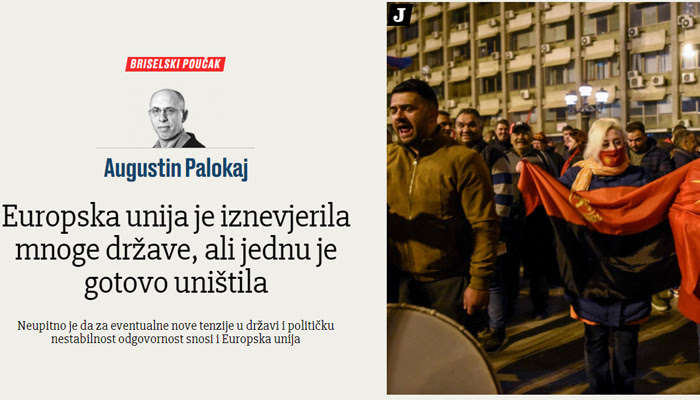The European Union let down many countries, but almost destroyed one. It is indisputable that the European Union bears the responsibility for possible new tensions in the country and political instability, writes “Jutarnji List”, commenting on the resignation of Prime Minister Zoran Zaev after the second round of local elections held on Sunday.
The daily says that the EU has not reacted to the situation in Macedonia for two days now. “The attitude that they do not comment on election results, especially local ones, can be understood. But the resignation of the Prime Minister changes the overall political situation not only in Macedonia, but also beyond”, writes “Jutarnji”.
The Prime Minister of North Macedonia, ie Macedonia (the country was forced to change its name in the hope that the doors to EU integration will open) Zoran Zaev resigned after his party suffered a heavy defeat in the local elections. At first glance, this seems like a reasonable act, proof of the sense of responsibility for failure, which is not a characteristic of politicians in the Balkans. The party leader is most deserving when he wins, but also most responsible when he loses. But Zaev’s resignation has a significantly broader context, “Jutarnji List” assesses.
The daily adds that the resignation comes at a time when Macedonia’s EU path is once again blocked. This time, it writes, it was Bulgaria that is at loggerheads over identity issues, including the ethnicity of some historical figures. For example, is Goce Delcev Macedonian or Bulgarian? “The answer to this question is currently the biggest obstacle in the EU enlargement process. Not only for Macedonia but also for Albania, because if Bulgaria blocks Macedonia, then some other countries do not agree to open accession negotiations with Albania. And so the whole process stands still, comments “Jutarnji”.
The reform government of Zoran Zaev, the newspaper continues, was accused by its opponents of betraying national interests, and that the government, hoping to remove the last obstacle on the road to the EU, agreed to change the name of the country. “Indeed, Greece lifted its blockade, but after that, the blockade by Bulgaria followed, and if Brussels is to be believed, the dispute with Bulgaria is the only obstacle,” the daily said.
It is hard to believe, “Jutarnji” further comments, that Bulgaria itself could have prevented the opening of EU negotiations with Macedonia, which is only the first step on the long road to integration, without the tacit consent of some other countries. “If Germany and France really wanted to open the negotiations, it would have happened. A way would have been found to persuade Bulgaria to open negotiations now, and to resolve open issues during the process, the newspaper said.
No compromise in 15 years was enough for the EU to deliver on its promise. So, the sacrifice that the Government of Zoran Zaev made was in vain. In that way, the EU left Macedonia in the lurch, betrayed the expectations and did not fulfill not only the promises, but also the clear obligations. The EU has so far disappointed other countries, but none like Macedonia. At the beginning of the 21st century, Macedonia was the first country in the region on the road to the EU, ahead of Croatia. It was the first to conclude Stabilization and Association Agreement. While Croatia completed its path to membership and joined the EU more than eight years ago, now Macedonia is still waiting for the first step, the opening of negotiations, “Jutarnji” said.
The question arises, the newspaper adds, whether the current coalition will continue to rule with a new prime minister or will go to new elections again. “There will be elections in Bulgaria, third extraordinary, and after them there will hardly be a solution to the dispute with Macedonia. It will be even harder if there are new elections in Macedonia. At the same time, the interethnic relations in Macedonia are still sensitive, comments “Jutarnji”.
The European Union has so far asked Macedonia, but also all candidate or potential candidate countries, to implement reforms, fight against corruption and fulfillment of other conditions. Meanwhile, former Macedonian Prime Minister Nikola Gruevski, accused of corruption, has been granted asylum in the EU, where the current Enlargement Commissioner comes from. There are many absurdities in the relations between the European Union and Macedonia. However, there is no doubt that the European Union is also responsible for possible new tensions in the country and for political instability, “Jutarnji List” concludes.





Comments are closed for this post.